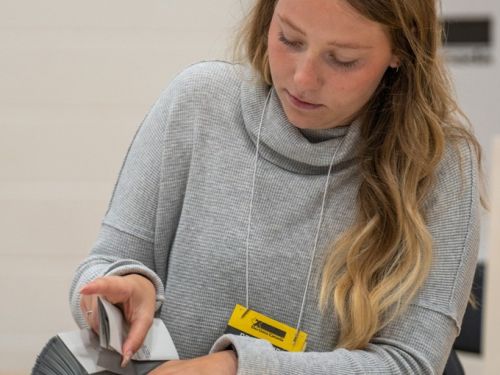“Remarkably consequential”: four Acadia political science students on why you should vote this April

Maybe it’s the flurry of news activity, or maybe it’s the sudden appearance of lawn signs all over Wolfville that tipped you off, but you’ve probably heard that we’re heading into a federal election this month!
On the news, commentators are saying that this could be a decisive election for the future of our country. Portia Clarke of CBC’s Information Morning says, “this is the most consequential election in a very long time.” Also on the news, a panel of Acadia political science students are urging young voters to get engaged and go to the polls this April.
Jocelyn Boudreau (fourth year, politics), Anne Christie (fourth year, politics), Esther Uhlman (third year, politics), and Stirling Shannon (third year, politics), joined Portia on her show to talk about why it’s so important for students to vote.
A dose of encouragement with a dash of tough love for young voters
Even though the issues at stake in this election will be massively impactful for the futures of young people in Canada, Anne says that “Young people aren’t super keen to get out and vote. A lot of them feel like they’re excluded from the electoral process, whether they don’t fully understand what’s going on or they don’t feel like their concerns are being heard.”
But for Esther, she says that she has seen a large youth presence in the local campaign she’s working on. “It is an extremely consequential election,” she says. “It’s an opportunity for our country to pick which path it wants to go down and I’m very excited about it.”
Portia asked each of the students what they would say to a young voter who is feeling disengaged or disenchanted.
Anne reassures young voters that “voting is a lot easier than it seems. It feels like a very overwhelming process, especially if you are a first-time voter.”
Esther says it’s important that voters “get informed. Look at the issues yourself, don’t rely on social media posts.”
Jocelyn gave voters an important reminder that while “yes, it’s so important to look at each party’s platform, also look at the candidate you’re voting for. It’s something you should take the time out of your day to do, because not everywhere has that chance.”
Stirling had some tough love for those who are disengaged from the process, but unhappy with the state of the current political landscape. “If you as a Canadian citizen who can vote, spent any more than half an hour in the past three and a half years talking about politics, complaining about politics, what you’d like to see be better, it takes less time than that to vote,” he says. “It’s remarkably consequential what the vote comes down to. To choose not to engage in that is to choose whoever everyone else votes for.”
Every voice—and vote—counts
Politics students like the ones we heard from on CBC might have special insight into the machinations of politics, but every single student at Acadia—and every person in Canada—has a unique and valuable perspective on what our country should look like. Whether you’re taking kinesiology, biology, or English, you have something to offer to the conversations that will shape our country in the coming years.
Talking to your peers about politics is an age-old university tradition for good reason. You are all here in one place, you’re smart, engaged, and are the future of our country. So, what do you think? Grab a group of classmates and a coffee and talk it out! Then, get ready to speak with your vote on election day.
